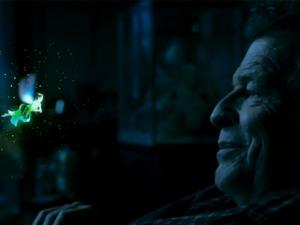The episode of Fringe “Black Blotter,” which aired last week, fascinated a lot of people because of its LSD-augmented aspects, and in particular its surreal tribute to Monty Python (with an Empire Strikes Back moment worked in for good measure). There has been a connection between religion and psychedelic drug use for as long as people have been experimenting with the latter, and so it is perhaps unsurprising that religious topics and themes were prominent in the episode. If you have yet to see it, be warned, there are SPOILERS AHEAD.
 Walter's LSD-prompted hallucinations, including of his dead assistant, reminded me of LOST. Once again, Fringe seems like “LOST with answers.” Yet if the island had turned out to be a natural source of LSD, so that all the weird experiences of the survivors were drug-induced hallucinations, I don't think we would have been satisfied. But on Fringe things are different, even when there is a striking resemblance to another show created by J. J. Abrams.
Walter's LSD-prompted hallucinations, including of his dead assistant, reminded me of LOST. Once again, Fringe seems like “LOST with answers.” Yet if the island had turned out to be a natural source of LSD, so that all the weird experiences of the survivors were drug-induced hallucinations, I don't think we would have been satisfied. But on Fringe things are different, even when there is a striking resemblance to another show created by J. J. Abrams.
There is a significant focus in the episode on something Walter said to his assistant back when she was still alive – back when he was the man he fears he is turning into again. She had raised objections to Walter's plan to pass to the parallel universe, and had suggested in the context that some things are not appropriate for human beings, but only for God. Walter replied, “There is only one God in this laboratory – and it isn't yours.” His assistant's response reminded him that her statement was not just based on the fact that she goes to church on Sunday – she also has three degrees in physics, and knows what the consequences will be if Walter presses ahead. And of course, she was right, it turned out
What makes the episode distinctive is that it inverts the traditional motif of the “scientist playing God.” Walter fit that stereotype once – indeed, he'd had the idea (which William Bell tried to implement in a previous season) to make his own universe.
But now Walter is trying to avoid becoming that man again. He is trying to cling to humility, and to compassion, and to reject hubris and arrogance.
The norm in science fiction is for there to be good guys who try to stop the conscience-free mad scientist(s). It is refreshing that Fringe depicts a scientist trying to stop himself from following a path – and becoming a person – that will wreak havoc and cause harm. The world is more complex than good guys vs. bad guys. The line between good and evil cuts through each of us. I appreciate that Fringe's story and characters depict that, rather than taking a much more simplistic approach that is all too common.
If you have seen the episode, what did you think of it?












